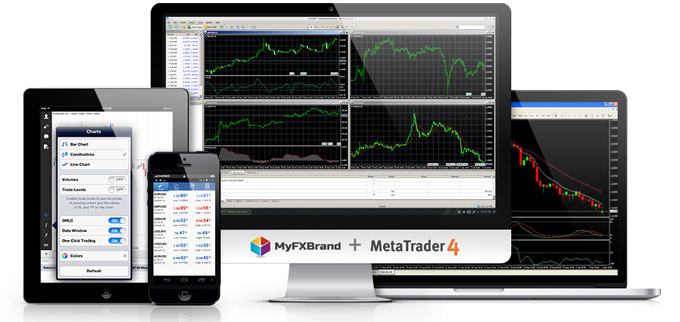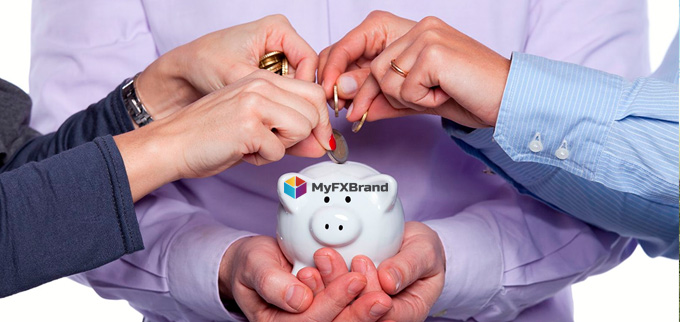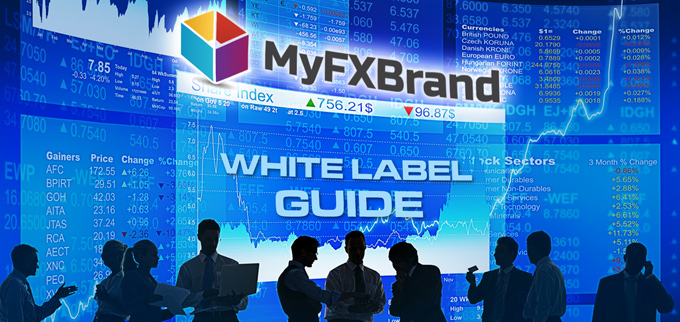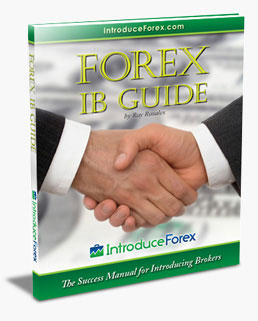Forex is the regulated financial market that provides the path of least resistance to companies and individuals that want to refer business for compensation. Participation can be as basic as becoming an Affiliate or Introducing Broker (see IB section) of an existing brokerage firm or as elaborate as running your own brokerage under a rebranded referral solution known as a “White or Private Label.”
What is FX White Labeling?
A Forex White Label business enters into a partnership agreement with an existing FX brokerage firm to receive access to the broker’s trading platform and liquidity, but under the unique brand of the white label affiliate.
This solution allows the affiliated company to build and strengthen its brand in the realm of currency trading while minimizing the huge costs and legalities that accompany the launch of a full blown, licensed brokerage firm from scratch.
This may all sound fine and dandy so far, but is something you should really get into? Based on many years of hands-on experience in this industry, I can honestly tell you that most businesses that are thinking about a White Label are either oblivious of what it actually requires or are not prepared to start one at all! “Why not,” you ask? That is the main objective of this article. Not only will I explain what white labels are all about, but also show you what you need to know to succeed after you start your own. So sit back and absorb!
Partial vs Full White Label Solution – A Misconception Cleared!

There are two ways to structure a white label business in Forex: partially or fully.
As I explain the two, I would also like to make an important clarification: “Partial” does not mean free or offered at a discount!
Unfortunately, over the years, many clueless internet ferrets have come to believe otherwise; that a “partial white label” means a free ride in the branded Forex train. This could not be further from the truth. When you see the word “partial” applied to a white label solution, it is not referring to a partial/lower fee or a free trading solution of any kind. Whereas a “Full” White Label involves two key components, a branded trading platform and the ability to take deposits directly from customers, a partial solution does not. The partial setup does include the rebranded platform (with the name/logo of the partner on it), but not the ability to take deposits.
As explained in the white label section of our website, a partial white label is definitely the easier solution to implement; but if for whatever reason, a private label business does not want to handle customer deposits directly, clients must send their money straight to the licensed broker. This means that the Chinese Wall or complete level of anonymity that exists between the customer of a full white label and the brokerage firm licensing the trading platform is nonexistent for a partial white label affiliate. Nevertheless, the same fees associated with branding the platform still apply to both partial and full arrangements (see later section, “Taking Deposits – Is it a Smart Move?” to learn more).
What Trading Platform do I Offer my Customers?

Choosing the right trading platform or software is one of the critical first steps of running a successful white label program. Unfortunately, many inexperienced companies opt for the free, proprietary platforms that some brokerage firms offer. This is a big mistake. If your potential customers are not familiar with the platform that you decide to go with, it’ll be more difficult to convince them to open accounts with your firm. Furthermore, if you ever want to part ways with the existing brokerage firm in the picture and move your clients to another broker, the learning curve associated with a new platform might discourage your clients from moving.
The best way to minimize the risk associated with marrying your firm to the wrong platform is to go with one that’s the closest thing possible to a market standard.
When it comes to retail Forex, the software that most currency traders use and prefer is Metatrader 4, a.k.a., MT4. The Metatrader platform, developed by the Russian company MetaQuotes, has been in existence since 2003 and has gone through various version changes, including MetaTrader 3 in 2003, MetaTrader 4 in 2005 and MetaTrader 5 in 2010. Despite its most recent release, MT5 continues to be much less popular than MT4 and most brokers today use MT4 instead of MT5.
An advanced free charting suite, ample historical data, unlimited free demos, and its solid support for algorithmic trading (via “robots” or “expert advisors” [EAs]) are just some of the beneficial features that continue to make MT4 the platform of choice for millions of traders and hundreds of FX brokers worldwide.
The huge popularity and dominant position MetaTrader 4 enjoys in the foreign exchange market makes it the natural choice for any white label provider. It is the platform that we strongly recommend all of our clients to use. Doing otherwise would be like trying to stop a tsunami in its tracks. Don’t try it at home!
As far as fees are concerned, MetaQuotes charges standard upfront and monthly fees to all licensed brokerage firms for each MT4 white label they sub-license to their referral partners. There’s no exception to this rule.
As of the date of publication of this guide, these fees amount to US$5,000 up front per sub-license and US$1,000 monthly to cover the server that’s required for the proper operation of every rebranded MT4 platform. Some brokerage firms charge additional fees on top of this, but most do not. An even fewer number may pay these fees on your behalf or rebate the charges back to you once your client network is generating a certain amount of trading volume every month (to learn more about white label incentive programs like these, please complete the following form).
You can learn more about the customization and branding process behind MT4 by reading our blog post, “Inside an MT4 White Label – Your Branded Logos.”
Costs of Running a White Label Partnership

In addition to fees for setting up, branding and managing your platform (see previous section), operating a private label business is just like running any other business. There are expenses associated with it.
These expenses will normally be lower for partial white label setups, since they will not have the added complications [or fees] associated with accepting customer deposits directly (such as making initial and ongoing escrow deposits, setting up merchant accounts for credit card funding, etc.). Nevertheless, staffing fees are still likely to apply, since it’s probably impossible [and flat our crazy] to try to operate a white label partnership as a one-man show. Depending on your exact business model, you may have to hire people to handle customer education and support, marketing, accounting, management and IT.
Will your business be Internet-based, brick-and-mortar, or both? If you plan on having a physical location to meet or train clients, you need to factor in office leasing costs, occupational/licensing fees, security expenses, etc. Depending on your geographical location, this can add a few thousand dollars a month to your list of business expenses.
However you decide to structure your white label business, make sure that you first think carefully about all of the expenses you will likely incur prior to getting started, then handle your budget intelligently to give your business a better chance to succeed over the long run.
Good Candidates to Succeed as White Labels

Just because you have the money to brand your own FX platform and start a private label business doesn’t mean you’ll become an instant success (or ever succeed for that matter). This is a fact, despite what certain unscrupulous brokerage firms in the industry would like you to believe.
The thing is that, like in any business, certain organizations and individuals will have a better edge as white label providers. Normally, experience in finance, investments, and/or trading (especially Forex) helps immensely. This should not come as a surprise to anyone. It’s just common sense.
You would not expect to become a successful brain surgeon without first going to medical school and practicing on a lot of animals, right? The same is true with a white label. Before you decide to start your own, make sure that you have some type of experience or education that can act as the foundation upon which you’ll build your empire.
For a more specific list of high-probability candidates, you can access the this section of our website. In our “IB Guide,” we also provide a detailed list of businesses that are well-positioned to succeed in the IB space. This list is also relevant for white label partners.
Customer Incentives – What do You Have to Offer?

If you become a white label broker, what would you have to offer? This may sound like a dumb question and one that you may answer in an equally dumb manner such as, “Duh! I would have a white label to offer!”
All kidding aside, I hope that the answer above didn’t cross your mind even subconsciously! Yes, it’s true. Anyone can pay the fees to brand a trading platform like MT4, throw up a generic website, and be up and running pretty quickly. After all, a white label is a white label, right? WRONG!!!
Yes, from a point of view of functionality (providing clients the ability to trade currencies on a branded platform), all private labels are the same; but if all you have in mind is pretty much just that, without trying to stand out from your competition in any way, there’s a 99% chance that you’ll flat out fail. No kidding!
If the above information just kind of burst your bubble, then good! Better now than later, after you spend all your time and money trying to fight a losing battle whose only byproduct is a lifetime addiction to Prozac.
The truth is that unless you can already generate a huge number of financial or Forex related leads, running a bare-bones business in foreign exchange without providing attractive incentives or value-added services to your clients is equivalent to committing financial suicide.
That’s why we recommend that, before spending one cent to set up a white label program, you ask yourself questions such as, “What will be my company’s niche if I get into this business?,” “In what areas will my company really stand out from the competition?,” “Why will customers open trading accounts with me and not my competitors?,” “What do I have to offer?”
I recommend that until you have good answers to the questions above, you hold off on the launch of your white label. Simply put yourself in your clients’ shoes and come up with a convincing list of incentives that will convince your customers to do business with you.
A failure to heed to this advice is one of the main reasons white label organizations eventually fail. That’s what I’ve discovered in over a decade of helping referral businesses succeed in the foreign exchange market.
Don’t become a statistic. Whether it’s education, helpful tools, or anything else that your clients will appreciate, focus on offering your customers value.
NOTE: In our “IB Guide,” we explore how to provide value to potential clients in greater detail; information that also applies here.
Choosing a Good Broker to Work With

Your white label organization requires a strong foundation. That foundation will be weak unless the brokerage firm that you decide to use, the one that will provide your platform and trade execution, is good. In fact, the entire success of your business as a private label is piggybacked on the quality and reliability of the broker that you choose.
How safe is the brokerage firm you want to work with? How good is their quality of execution? How flexible are they in working with their IBs and white label partners?
Since having favorable answers to these three questions is so essential to your company’s future, I will address each one in a bit more detail below.
-
Safety of Funds
In our blog and during client seminars, we have spoken in depth about the importance of working with a broker where client funds are safe. There are a lot of misconceptions when it comes to this; the most common one being that the bigger the firm, the safer the money. This cannot be further from the truth!
Often times, large Forex firms, especially in the United States, have hid behind the false sense of security that investors have been brainwashed with when it comes to big brokers. That’s why it is important to do your homework on the broker you are planning to partner up with and not be misled by mere size (read the “Safety of Funds” section of the Forex IB Guide and our blog post, “What Every Forex IB Should Know about Client Account Safety”). Enter into a white label agreement with a firm that goes the extra mile to protect the money of their clients; one that implements additional layers of security (like fund segregation and 3rd party administration and monitoring) for the sake of its customers.
-
Quality of Execution
A high quality of execution is also important when running a trading business. If clients do not experience quick fills on the buy/sell orders they place, it will become more difficult to convince existing clients to stay and new clients to do any business with you whatsoever. Please note that I’m not talking about spreads here. Spreads are important too, but if a broker doesn’t provide fast executions, tight spreads on EURUSD or any other currency pair won’t really matter. Remember that if you run a full white label program, your clients will never find out who the actual broker behind your platform is. Nevertheless, they will still judge you for any poor execution they happen to experience. You cannot allow something like that to ruin your reputation as a firm. Believe me; news on bad brokers travels fast on the web (make sure to read “Quality of Execution” in the IB Guide)!
-
Flexibility
An inflexible broker with great execution and a high level of account safety still doesn’t make a good partner. Think about it. If a firm treats you like just a number and does not cater to the specific needs associated with your particular business model, you might as well go elsewhere. Sooner or later, a brokerage firm that is not flexible is going to make your life a living hell. Discuss your specific plans with the brokers you’re considering before you marry your firm to one of them. Make sure that they fully understand and will work with you, so that you can put those plans into action quickly and effectively.
Make sure that you work with a brokerage firm that offers account safety, good execution quality, and plenty of flexibility. You owe it to your customers and to the success of your organization.
Making Your Brand Look Like a Million Bucks

Even if you meet MetaQuotes’ requirements for the logo and images necessary to brand the MT4 platform (specified here), it may not be enough. Yes, the platform will still work, but will it portray your brand professionally and attractively in the eyes of your clients?
You wouldn’t believe the amount of unprofessional looking images that white label partners we work with send our way! Some preschoolers do a better job at finger painting!
Before even getting started in the branded FX space, you need to make sure that your business name, logos, images, and any other visual representation of your brand instills a sense of trust and confidence in your clients. This is an area where we recommend that you invest time and money to get it done right. Many potential clients will take only seconds to judge your business. Why risk a rejection due to a poor looking logo? It’s just not worth it.
One thing that you can do is a study of other FX companies in the industry. How are they doing it? Please don’t get the wrong idea here. I’m not telling you to blatantly copy someone’s name or logo, just to get some basic visual ideas. If you don’t already have a unique, powerful, and professionally looking brand in mind, see what’s currently in the market and improve upon it – do it better!
Don’t worry. You don’t have to become an artist and paint the next Mona Lisa to make a white label work. It’s not that difficult, but regardless, we’re here to make your life easier. We can analyze your branding initiative and either give you our seal of approval or steer you in a different direction.
Taking Deposits – Is it a Smart Move?

To take or not to take? That is the question for a white label partner when it comes to customer deposits.
Do you want your customers to fund their accounts directly with you (full white label option) or with the broker that’s sub-licensing the trading software (partial white label setup)?
This is an important question to answer. Even though the ideal solution for you will depend on your specific objectives, each option comes with its set of advantages and disadvantages.
One big advantage of not taking deposits and operating as a partial provider instead is simplicity. Getting the platform branded is something that’s relatively easy to do and can be accomplished in less than two weeks if all your company documents are in order. It is also simpler to allow your customers to deposit their money directly with the licensed brokerage firm that’s providing your platform. In fact, if you go this route, your customers will likely feel more secure because they will know that their accounts and money are with a well known and regulated broker (not a new private label brand).
This may not sound so bad, but if you require anonymity, it will not work for you.
If your clients deposit their money with the brokerage firm you work with (instead of with your firm directly), they’re going to find out who the real broker behind the platform is (even though the platform is stamped with your logo and company name). When it’s time to send the money to fund their trading accounts, they’re going to know. This may not be a big deal if you already have a strong, established brand in another complementary market (e.g., financial blogs, gambling sites, etc.) and simply want to extend that brand to FX without dealing with the additional hassles of processing deposits. However, if your objective is to appear as a full-blown broker and not let your customers know who the actual brokerage firm behind the platform is, this arrangement becomes very disadvantageous. To achieve anonymity between your clients and the platform provider, you need to accept deposits yourself.
You may say to yourself, “No big deal. I’ll just accept deposits directly from my customers then.” The problem is that accepting deposits comes with its unique set of challenges too.
To start, what deposit methods do you plan to offer your clients? It is true that some clients, especially those opening larger accounts, will fund mainly via wire transfer, which require no special system or technology to process them. Clients with smaller accounts, on the other hand, normally prefer funding via credit card, since from a percentage basis, credit card fees will be relatively lower than wire fees for smaller deposits.
But before allowing clients to fund their accounts via credit cards, you’ll need to be able to process them. You’ll need a secure online interface to accept and carry out credit card transactions and also a merchant account to receive the funds. If you are a brand new white label company without extensive banking history, a merchant account might be a bit of a challenge to open and the processing fees you’ll likely incur will be higher than normal. Given the fact that most brokers nowadays tend to absorb the credit card fees on client deposits anyway, this will become an added cost for your business initially if you do the same.
How about using a payment system like PayPal, Skrill or Neteller for deposits? The percentage fees associated with these systems are also relatively high, sometimes even higher than for direct credit card funding. Furthermore, some of these online payment systems consider Forex companies high risk, so they either have a strict and lengthy due diligence process before accepting a new merchant or may not accept new Forex merchants at all (e.g., PayPal).
In addition to overcoming the challenge of setting up credit card processing or alternative funding solutions for their traders, full white labels will also have to overcome the additional hurdle of getting clients to trust a relatively new company with their money.
Partial white label partners don’t have this disadvantage. Their clients know that their account funds are in the hands of a well-known and regulated firm. A full white label client, on the other hand, knows that they are sending their funds directly to a broker without a long track record behind it. Unless that client had a preexisting, trust-based relationship with the broker, funding will become an added challenge.
Given the unique advantages and disadvantages of full and partial white label solutions, it is crucial that your Forex company chooses the right one. After you complete our short form, we’ll first discuss with you your objectives and ideas; then, recommend the best solution – the one that will give your branded FX business the best chance to succeed.
Laws Affecting White Label Programs

If the topic of laws and regulation don’t make you cringe, you need to check your pulse!
It is no secret that in the first two decades of the 21st century, Forex has seen an exponential increase in regulatory laws. Likewise, compliance requirements around the world have reached nose bleeding heights. In some large countries, like the United States, the level of regulation has escalated to such a point that most smaller brokerage firms, IBs, and white label providers have disappeared from the FX industry altogether. Many even argue that all of this has been no accident, but instead the coordinated move by large governments not to protect investors, but to lure traders and other participants back into traditional markets (like stocks and futures) and away from alternative, global markets like FX.
Wherever the truth lies, your branded FX business can easily meet its demise if you do not tread the legal waters intelligently and with caution.
Back in the late 90s and early 2000s, it was much easier to start a private label business and offer traders your own version of the MT4 platform without needing to overcome many legal hurdles. This is not the case today.
Whether or not your white label business will have to register or get licensed with a regulatory body, deal with government audits and meet strict compliance requirements will depend on one thing: location, location, location. No, I’m not talking about property values here. This is not real estate! I’m referring to the location of the broker you work with, the location where your business operates or is registered, and the location of the clients you are targeting.
Let’s say, for example, that you choose to go with a brokerage firm in the United States. By law, US-based foreign exchange brokers need to register with the NFA (National Futures Association) and be regulated by the CFTC (Commodity Futures Trading Commission). Likewise, IBs and white label partners of these NFA brokers must also register with the NFA/CFTC. The fact that the regulatory environment in the US is so draconian when it comes to Forex means that, if you choose to go this route, you’re in for a fair share of annoyances and headaches!
Depending on the country where you form the entity you plan to use to run your white label business, you might also have to register or get licensed there. However, there are many countries where you can incorporate your business that do not have such regulatory requirements. Nevertheless, even if you incorporate in a country with lax Forex statutes, you might still fall under the scrutiny of their regulators if the office where you meet clients is in that same country. That is why you need to choose your country of incorporation and your base of operation carefully. They don’t necessarily have to be in the same place.
Finally, where are the clients that you plan to target? If they live in the United States, you will also fall under the aforementioned NFA/CFTC umbrella. Consequently, if you opt for the typically wiser solution of establishing your FX business outside of the US, you will need to forgo US-based clients altogether.
You may think that all of these legal issues make the establishment of a white label program far too difficult, but don’t despair. We provide careful guidance in this area. There’s no sense in starting a private label and then getting bogged down by tedious compliance requirements or, even worse, getting shut down unnecessarily by an overpowering regulator with an ax to grind!
Please complete our information request form to discuss the legal implications of running your own FX business.
3 Reasons Why You Shouldn’t Start a White Label Business

As we mentioned earlier, most organizations that want to become white labels in order to run their own brokerage firms are not very qualified to do so. Some of these “unqualified” groups go ahead and try doing it anyway [with a very, very low rate of success]. It is with these groups in mind that we created this section.
If, for whatever reason, you are not in the ideal situation to start a private label at the present time, isn’t it better to work first on correcting whatever deficiencies are causing you to be in that state, then revisit your plans when you are properly equipped? Of course it does.
When you read the three main reasons why you should hold off on becoming a white label below, think about your current situation. If any of these three apply to you, delay your launch date and focus on your problem areas.
-
No Money
We get a lot of requests on a daily basis from people all over the world who are looking for free white label solutions. As we discussed in the earlier section, “What Trading Platform do I Offer my Customers?,” starting a branded FX business based on a platform other than MT4 (MetaTrader 4) is like swimming against the current with one arm tied behind your back – not advisable!
Unfortunately, each standard MT4 platform that a broker sub-licenses to a white label partner costs money. To offer you that platform for free, a brokerage firm must foot the bill. Given that 70 to 90% of new businesses in any field don’t succeed, do you think that many brokers would be left standing if they paid US$5,000 up front and US$1,000 a month for every start-up who requested a free MT4 white label? Let me know if you need a hint to answer this question.
Some might argue that a more cost effective alternative is to go with a different platform, one that a broker might be willing to offer you for free. Although you will find free white label platforms like these in the market, they are proprietary in nature; that is, offered only by a particular brokerage firm. This poses a huge risk to to the future success of a white label provider. First of all, it is more difficult to convince traders to use a platform that is not popular. Second of all, if you magically find a way to build a large client base on the backbone of proprietary software, then decide to part ways with your broker in the future for any reason, you will not be able to find that software anywhere else. In essence, you’re married to that brokerage firm forever.
In the “Costs of Running a White Label Partnership” section, I explained that a branded FX business will likely have many other expenses other than platform fees. It is just not feasible for you to provide a responsive website with fresh content, value added services to your clients, and customer support, while handling accounting, marketing/advertising, and potential legal/compliance issues without any additional costs. As you ponder over these facts, the scenario of starting a white label for free begins to look pretty absurd indeed!
Your most cost effective bet to be able to run a successful MT4 private label is to join forces with a brokerage firm that “lessens the load” for partners that generate an attractive level of trading volume. For example, some firms pay all the platform fees on behalf of white label affiliates that first become successful Introducing Brokers. Other firms may rebate the initial MT4 platform fees once the partner reaches a reasonable monthly volume threshold. This arrangement is attractive for both brokerage firms and white label partners. Think about it…if a Forex business cannot generate enough trading volume to afford its expenses and grow, it doesn’t stand a very good chance of surviving for very long. By investing in higher volume partners, smart FX brokers can invest their money where it makes more sense.
If “no money” is the category that defines your particular situation, what can I say? Become successful first as a Forex IB and then, once you have demonstrated that you can make it work, set your sights once more on a white label program (to learn more about introducing brokers, make sure to read our main IB section and guide).
-
No Experience in FX
There are usually two groups that fall into this category. The first group typically consists of unsuccessful people who think that anyone who comes within 10 miles of anything Forex becomes magically successful. Even though this group has very little to no experience in FX, they still want to jump in the crème de la crème of the Forex business spectrum with both feet. Never mind that they can always kick the tires a bit as an IB first without risking their own [or anyone else’s] financial life in the process. Nah! That’s not good enough for them. They want to shoot for the stars on their first FX plate appearance. Can everyone say, “self delusion!”
The funny thing is that, most of the times, this group also suffers from ailment #1 above. Dear delusional explorer, please learn what an FX expedition is all about before trying to climb Mount Forex!
The second group in this category might already be successful in another field and wants to expand into currency trading. Even though this group has the monetary resources to get a branded FX solution going, without the proper guidance from experienced FX professionals, every dollar they spend will likely go up in smoke. There are ins and outs to any business and Forex is no different. If you belong to this group, I advise to proceed with caution, even if you do hire people to help you. As a businessman, there’s nothing better than learning about a business yourself before hiring others to run it for you.
Regardless of whether you are a clueless tire kicker or a successful business person without FX experience, we will show you the steps you should be taking in order to increase your chances of making a white label broker work after launch (click here to complete our form and request assistance in this matter).
-
Nothing of Value to Offer
Even though you may have experience in Forex, launching a white label business that offers the generic stuff everyone else is offering [a platform that people can trade on] is generally not a very good idea. Why would any customer choose you over your competition?
Of course, there are exceptions to this rule. Maybe you run a high traffic website, like an online casino with millions of visitors, and can still get your clients to open Forex accounts by relying on the sheer probability of numbers. Maybe you operate a popular financial website or trading room that generates a lot of potential eyeballs. If you do have a complementary business like this with many visitors, a generic white label program might work even if you’re not offering any incentives to make your firm stand out in the crowd.
However, even if you’re fortunate enough to have a business that’s in a similar category to the ones above, you should still look for ways to sweeten the deal for your customers. It’s the intelligent thing to do, because offering them value will not only increase your lead-to-account conversion. It will also keep clients trading with you for a longer period of time.
Now, if you do not have a large surplus of financially related leads, implementing a white label solution without offering any attractive incentives to your currency traders is a bit of a crap shoot. Maybe you find a way to make it work, but maybe you don’t. The odds are stacked against you and, like in trading, business success has a lot to do with aligning the probabilities in your favor. So, like I suggested in the earlier section “Customer Incentives – What do you have to offer?,” if you don’t really have anything special to offer potential clients, your best bet is to work on that until you do. It will give you that extra edge in an already competitive FX brokerage space.
Since timing in business is crucial, it would be wise for you to heed the above advice and wait for the right moment to start your own brokerage brand.
I Don’t Think a White Label Solution is for Me – What are my Other Options?

So you’ve read our entire guide word for word, pondered over your current situation, analyzed your strengths and weaknesses, and decided that a white label Forex solution is either not for you or something that you shouldn’t focus on at the moment. Now what? Should you forget about a business in foreign exchange completely? Maybe not…
The fact is that you’ve had a more accessible and cost effective gateway into the FX market at your disposal all along; a path of lesser resistance. What I’m referring to here is the business of an introducing broker or IB.
No, it doesn’t offer the platform branding possibilities of a full or partial white label, but when it comes down to the nitty-gritty, an IB business can make as much or even more money than a private label setup. An introducing broker does not have any initial or monthly platform fees to pay and doesn’t have to worry about the nuisances that accompany the processing of customer deposits and dealing with potential compliance/legal issues. An IB’s rebate or commission payout is typically also the same as in a white label partnership.
Now, don’t get me wrong here. A business with very little experience in FX or trading will still have a difficult time making an IB business work. However, even utter failure as an IB will not leave the deep financial scars that a failed white label start-up could.
Furthermore, depending on the brokerage firm that you sign an agreement with, when you succeed as an introducing broker and start generating a good level of monthly volume, the firm you work with might very well foot the bill for rebranding the platform (typically the largest expense for an MT4 white label setup).
If you feel that a Forex IB business model is more appropriate for you at this time or if you want to learn how to improve the level of benefits associated with your current IB program, please complete our form by clicking here.
Conclusion

Congratulations for having made it this far!
If you follow the tried-and-true advice in this guide, your chances of succeeding as a white label business will increase exponentially. But you don’t have to embark on this journey alone. Take advantage of our many years of experience helping a great number of FX businesses succeed. Let us guide you, step by-step in the right direction. We’ll start by discussing your ideas and objectives and let you know if they make sense as they are or should be modified to help you save money, time and headaches. This is a must before you sign your white label agreement.
When you’re ready to give your own Forex brand a go or if have any questions before getting started, just complete our short form below.
I wish you much success in the world of FX!
Works Citied in this Publication
Forex IB Guide – The Success Manual for Introducing Brokers
https://www.introduceforex.com/forex-ib-guide.pdf
Main IB Section
https://www.introduceforex.com/introducing-brokers/
Main White Label Section
https://www.introduceforex.com/white-label-solutions/
Inside an MT4 White Label – Your Branded Logos
https://www.introduceforex.com/inside-mt4-white-label-logos/
What Every Forex IB Should Know about Client Account Safety
https://www.introduceforex.com/every-forex-ib-know-client-account-safety/


